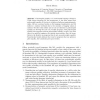Free Online Productivity Tools
i2Speak
i2Symbol
i2OCR
iTex2Img
iWeb2Print
iWeb2Shot
i2Type
iPdf2Split
iPdf2Merge
i2Bopomofo
i2Arabic
i2Style
i2Image
i2PDF
iLatex2Rtf
Sci2ools
108
click to vote
TIC
1998
Springer
1998
Springer
Polymorphic Equality - No Tags Required
Polymorphic equality is a controversial language construct. While being convenient for the programmer, it has been argued that polymorphic equality (1) invites to violation of software engineering principles, (2) lays a serious burden on the language implementor, and (3) enforces a runtime overhead due to the necessity of tagging values at runtime. We show that neither (2) nor (3) are inherent to polymorphic equality by showing that one can compile programs with polymorphic equality into programs without polymorphic equality in such a way that there is no need for tagging or for runtime type analysis. Also, the translation is the identity on programs that do not use polymorphic equality. Experimental results indicate that even for programs that use polymorphic equality, the translation gives good results.
Controversial Language Construct | Polymorphic Equality | Software Engineering Principles | System Software | TIC 1998 |
Related Content
| Added | 06 Aug 2010 |
| Updated | 06 Aug 2010 |
| Type | Conference |
| Year | 1998 |
| Where | TIC |
| Authors | Martin Elsman |
Comments (0)

